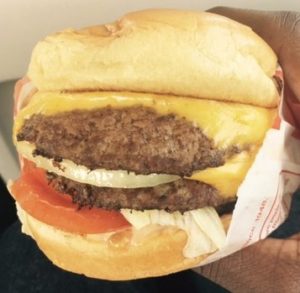 I was eating some fire enchiladas at this Mexican place when I heard a disturbing conversation.
I was eating some fire enchiladas at this Mexican place when I heard a disturbing conversation.
It was even worse after I sat up to breathe and caught a glimpse of who was talking.
There was a guy explaining how to “eat healthy” to a young lady at his table who was struggling with her weight.
What a nice thing for him to do right?
The problem was, he couldn’t have weighed less than 300 pounds.
I’ve never heard that much scientific jargon attached to food in my life, but it didn’t matter to her. She soaked up every word.
I could barely eat after that. I can’t stand when lies are told to people who clearly need help. And what’s worse is when a person’s lifestyle doesn’t even reflect the goal of their advice.
I went through a chubby phase myself, and I can tell you that a lack of knowledge is what keeps people that way, not a lack of will.
That’s why I feel it’s my duty to step in.
I’ve already explained how to lose weight before, but here I’m going to show you why “eating healthy” is the worst dietary plan to have.
Vague Goals, Vague Results
Before I go any further, I want you to define what eating healthy means to you.
Is it reducing your calorie intake? Increasing your protein? Or making sure vegetables cover half of your plate?
Chances are you’ll never define the phrase exactly like someone else.
When someone hears the words “eat healthy”, their interpretation will always differ from the person giving advice.
That’s a problem. When you have vague plans you get vague results.
So how do you go from having a vague goal like eating healthy to a definite goal that’ll actually work?
This is how…
The 2 Diets
Contrary to what the TV has told you, there are only two diets to choose from. Every new diet craze falls under one of these two diets or some combination of the two. They’re nutritional diets and weight control diets.
Nutritional Diets: Nutritional diets require you to eat specific types of food with your meals. They also limit the foods you can eat.
Some have a focus on vitamin intake, while others focus on nutrients like protein or fiber.
Everything from Atkins, Paleo, and most of the eat healthy advice falls under the nutritional umbrella.
These diets are for people who want specific nutrients to aid their body or for people who can’t eat certain foods due to medical concerns.
Diabetics follow a form of nutritional dieting because of problems with their blood sugar. Weight lifters follow nutritional diets to get more protein for the muscle-building process.
But if you don’t have special dietary needs and you’re not limited by medical issues, there’s no reason to follow a strict nutritional diet.
Weight Control Diets: Then there’s the weight control side. These diets don’t limit the type of foods you eat. They focus on your calorie consumption instead.
Everyone has a set number of calories that they’re currently eating to maintain their weight. And if you want to lose weight, all you have to do is eat below that maintenance level for a long period of time.
It doesn’t matter how much protein, carbs, or fat you consume. The calories you eat are what directly influence your bodyweight.
Keep It Simple
When most people throw around the eat healthy advice, they’re telling you to follow a strict nutritional diet. And while they may sound convincing, you’ve probably noticed that most of the eat healthy advocates aren’t exactly on the lean side.
You can eat all the kale, grilled chicken, and brown rice you want, but you won’t shed a pound without being in a calorie deficit.
All of those foods have great nutritional value, and you should eat them as part of a balanced diet. But if your main goal is to slim down and you’re not restricting calories, you’re wasting precious time.
Salad isn’t some magic food that burns fat. It’s just a mix of vegetables that has very few calories. You’d chew yourself to death before you reached your maintenance level eating salad.
When people lose weight by only eating these types of foods, they unintentionally add the weight control aspect to their diet. They don’t keep track of their calorie intake so they think their weight is a reflection of the foods they eat. And this is where they go wrong.
Yes, they’ll lose a few pounds at the start, but the next roadblock will put them back in place. Or maybe they just won’t feel like eating kale anymore.
Either way, they’ll get to this point and think they can’t keep losing. They’ll think that it’s impossible. And they’ll blame everything on their rising age or their metabolism.
But the real problem isn’t with their age or some hormonal imbalance. The real problem is that they lost their weight through ignorance.
Your weight isn’t a reflection of the foods you eat. It’s a reflection of how much energy, aka calories, you get from your diet.

Those people didn’t distinguish between nutrition and weight control. And now they’re confused and think it’s not worth the effort.
It’s all unfortunate, but you wanna know something funny?
Weight loss is easy.
It’s one of the easiest things I’ve ever done. Yet no one wants to tell you how easy it is.
People make you think you need to be a scientist and an Olympic athlete to do it. And hey, I don’t blame ‘em.
Why would anyone eat kale if they knew how to lose on their own? Who in the world would buy six pack fitness tapes? How many cheap ebooks would fitness blogs stop selling?
Confusion fills people’s pockets. What you don’t know is money in someone else’s wallet.
Don’t be a person who lets that happen. I’m giving you the info here so you don’t have to be like that.
Stop following the masses and their fads.
Get started on a plan that works instead.
-Drew
Leave a Reply